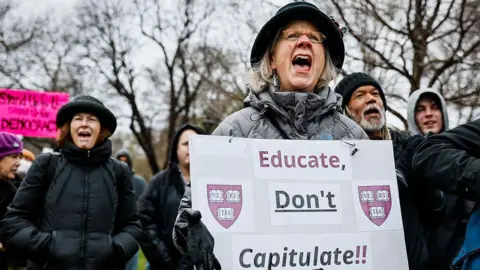Trump threatens Harvard's tax-exempt status after freezing $2bn funding
 Getty Images
Getty ImagesPresident Donald Trump has called for Harvard University to lose a valuable tax break, hours after his administration announced it is freezing more than $2bn (£1.5bn) in federal funds for the elite institution.
The White House has demanded the oldest university in the US make changes to hiring, admissions and teaching practices which it says will help fight antisemitism on campus.
Since returning to office, Trump has pushed to reshape top universities by threatening to withhold federal funds that are mostly designated for research.
Harvard became the first major US university to reject his administration's demands on Monday, accusing the White House of trying to "control" its community.
In a Tuesday morning post on social media, Trump threatened to go beyond withholding the federal funds and targeted Harvard tax-exempt status.
Universities, as well as many charities and religious groups, are exempt from paying federal income taxes. This valuable tax break, though, can be removed if the groups become involved in political activities or move away from their stated purposes.
"Perhaps Harvard should lose its Tax Exempt Status and be Taxed as a Political Entity if it keeps pushing political, ideological, and terrorist inspired/supporting "Sickness?" he wrote on Truth Social. "Remember, Tax Exempt Status is totally contingent on acting in the PUBLIC INTEREST!"
Losing the exemption could cost Harvard millions of dollars each year.
The Ivy League institution also has a fund of assets, or endowment, valued at $53bn.
Later on Tuesday, White House Press Secretary Karoline Leavitt said Trump wanted the university to apologise for what his administration says is continuing tolerance of antisemitism.
"[Trump] wants to see Harvard apologise, and Harvard should apologise," Leavitt said.
The sweeping changes demanded by the White House would have transformed Harvard's operations and ceded a large amount of control to the government.
Its letter to Harvard on Friday, obtained by the New York Times, said the university had failed to live up to the "intellectual and civil rights conditions" that justify federal investment.
The letter included 10 categories for proposed changes, including:
- reporting students to the federal government who are "hostile" to American values
- ensuring each academic department is "viewpoint diverse"
- hiring an external government-approved party to audit programmes and departments "that most fuel antisemitic harassment"
- checking faculty staff for plagiarism
President Trump has accused leading universities of failing to protect Jewish students when college campuses around the country saw protests against the war in Gaza and US support for Israel last year.
The letter orders the university to take disciplinary action for "violations" during protests.
In explaining its rejection of these demands, Harvard president Alan Garber said the university would not surrender its independence or relinquish its constitutional rights under the First Amendment protecting free speech.
"Although some of the demands outlined by the government are aimed at combating antisemitism, the majority represent direct governmental regulation of the 'intellectual conditions' at Harvard," he said.
- Columbia University agrees to Trump demand for mask ban
- Trump pulls $400m from Columbia University
- Why has Trump revoked hundreds of international student visas?
Shortly after his letter of resistance was sent, the education department said it was freezing $2.2bn in grants and $60m in contracts to Harvard immediately.
"Harvard's statement today reinforces the troubling entitlement mindset that is endemic in our nation's most prestigious universities and colleges," the Department of Education said in a statement.
The disruption of learning plaguing campuses is unacceptable and the harassment of Jewish students intolerable, the statement said.
A professor of history at Harvard, David Armitage, told the BBC that the school could afford to resist as the richest university in the US and no price was too high to pay for freedom.
"It's a not unexpected act of entirely groundless and vengeful activity by the Trump administration which wants nothing more than to silence freedom of speech," he said.
In March, the Trump administration said it was reviewing roughly $256m in federal contracts and grants at Harvard, and an additional $8.7bn in multi-year grant commitments.
Congresswoman Elise Stefanik, a Republican from New York, said on X: "It is time to totally cut off US taxpayer funding to this institution."
Harvard professors filed a lawsuit in response, alleging the government was unlawfully attacking freedom of speech and academic freedom.
Harvard is one of a number of elite universities in the crosshairs of the new presidency.
Columbia University in New York City agreed to a number of demands last month after the White House pulled $400m in federal funding.
But on Monday Columbia struck a less compliant tone, releasing its own letter that said it was continuing "good faith talks" with the government as it seeks to win back its funding, but also said it would "reject any agreement that would require us to relinquish our independence".
Polling by Gallup last summer suggested that confidence in higher education has been falling over time among Americans of all political backgrounds, partly driven by a growing belief that universities push a political agenda. The decline was particularly steep among Republicans.
Earlier on Monday, a lawyer for an organiser of pro-Palestinian protests at Columbia University said her client had been arrested by immigration officials as he attended an interview as part of his application for US citizenship.
Mohsen Mahdawi, a green card holder who is due to graduate next month, was detained on Monday in Colchester, Vermont.
Others who took part in campus protests against the war, including Columbia University's Mahmoud Khalil and Tufts University's Rumeysa Ozturk, have been detained in recent weeks.
